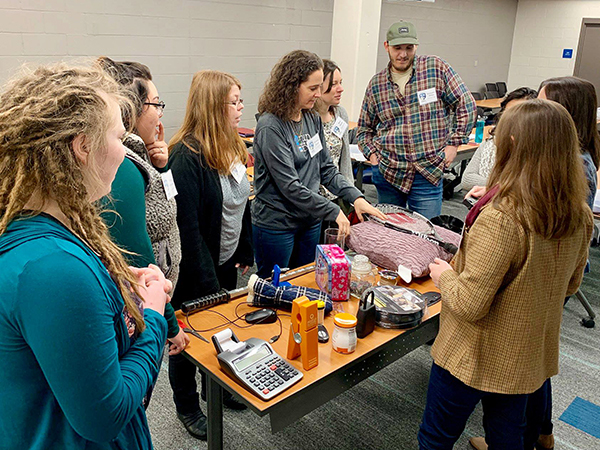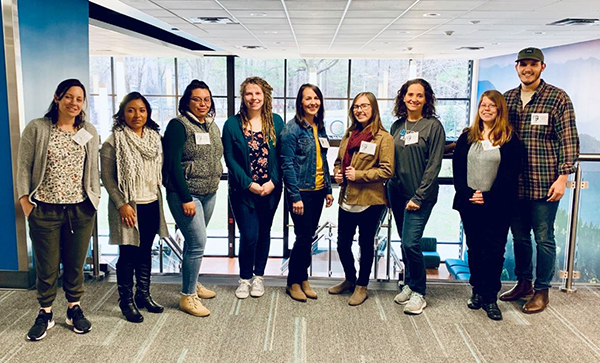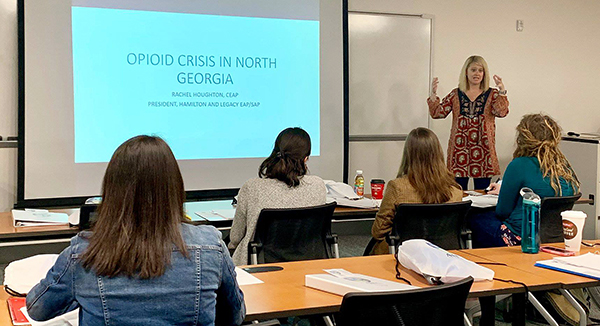News
Health Professions Students Participate in Interprofessional Scholars Program
04/22/19
 Interprofessional education has become increasingly important for students pursuing a career in healthcare fields. Dalton State’s School of Health Professions has made that a part of the school’s focus, increasing opportunities for students to come together for learning and hands-on experience.
Interprofessional education has become increasingly important for students pursuing a career in healthcare fields. Dalton State’s School of Health Professions has made that a part of the school’s focus, increasing opportunities for students to come together for learning and hands-on experience.
Now another option has been added.
Students can participate in the Blue Ridge Area Health Education Center’s Scholars Program, which centers around interprofessional education. AHEC is a nonprofit regional health education center dedicated to increasing the supply, distribution, and education of health professionals in Northwest Georgia.
“Interprofessional education is a huge topic in healthcare because health professionals don’t work in silos,” said Dr. Gina Kertulis-Tartar, dean of the School of Health Professions. “Nurses, respiratory therapy, radiologic technology, and social workers all have to work together. This program allows students to gain more experience working with other disciplines before entering the workforce. It allows students to understand what people working in other disciplines do and why, which makes them more effective in their role.”
This is the first year of the scholars program. Students earn a $1,000 stipend for participating, participate undergraduate research, present at conferences, and work toward a real-world solution to a health issue in Northwest Georgia.
 Ten students were chosen for the first cohort. The program lasts two years and utilizes online learning and in-person discussions, as well as experience in the field.
Ten students were chosen for the first cohort. The program lasts two years and utilizes online learning and in-person discussions, as well as experience in the field.
“There are a few reasons I’m participating, and one is that I know it will better prepare me for the workforce when I graduate, and it looks good on a resume,” said Chris Delmas, a social work major. “But also, it allows me to take what I’m learning in social work classes, take that education to other health professions majors, mix our perspectives and get a more holistic view. This program allows me to do research and present at conferences. We’ll be doing effective research and putting that to the test.”
The first year of the program consists of online learning modules and debriefings. The second year consists of 40 hours of onsite experiential learning, said Mandy Hunter, the preceptor coordinator for AHEC. The program is supplemental to what’s being done in the classroom and covers areas such as behavioral health integration, social determinants of health, cultural competency, and emerging health issues facing Northwest Georgia, she said.
For Leah Pitts, a respiratory therapy student, participating in the scholars program allows her to revisit her passion for community engagement that started when she was a high school student. Though that portion of the program won’t begin for another year, Pitts is excited to work with a team to address and find working solutions to an issue facing Northwest Georgia.
 “My goal when I first heard of AHEC was to focus on mental illness,” Pitts said. “Even though I’m respiratory therapy, everything is interconnected. I have seen how mental illness can develop into addictions. It can be mind-blowing to see how one part of a person’s health is connected to another.
“My goal when I first heard of AHEC was to focus on mental illness,” Pitts said. “Even though I’m respiratory therapy, everything is interconnected. I have seen how mental illness can develop into addictions. It can be mind-blowing to see how one part of a person’s health is connected to another.
“Sometimes there’s a mindset that one discipline is more important or better than another,” she said. “I’m trying to get everyone involved. I want all of us in different disciplines to have the same mindset that we’re all vital in the patient’s life. AHEC is geared toward that.”
Delmas likes to focus on the big picture when it comes to healthcare. He hopes to move into a social work field that is geared toward community building and/or policy and advocacy. He believes working with a group to address a community-wide healthcare concern in the program will help him reach his career goals.
“Chances are I’ll work in a rural community,” Delmas said. “Understand disparities and potential problems of people I’m serving is endlessly important. Having an opportunity to become more aware of those areas while working more effectively on a team is something I hope to get out of this program as well.”
